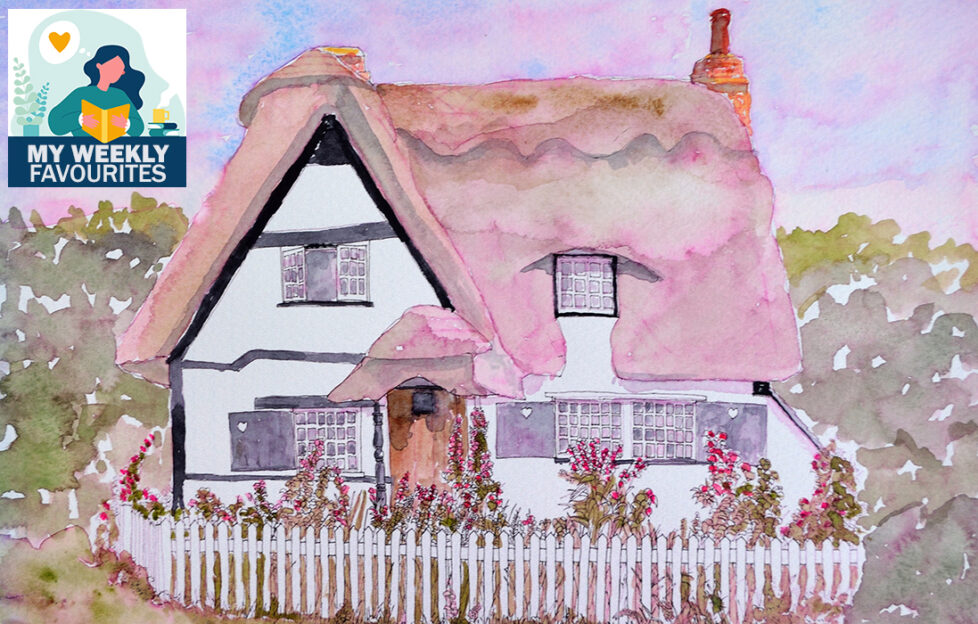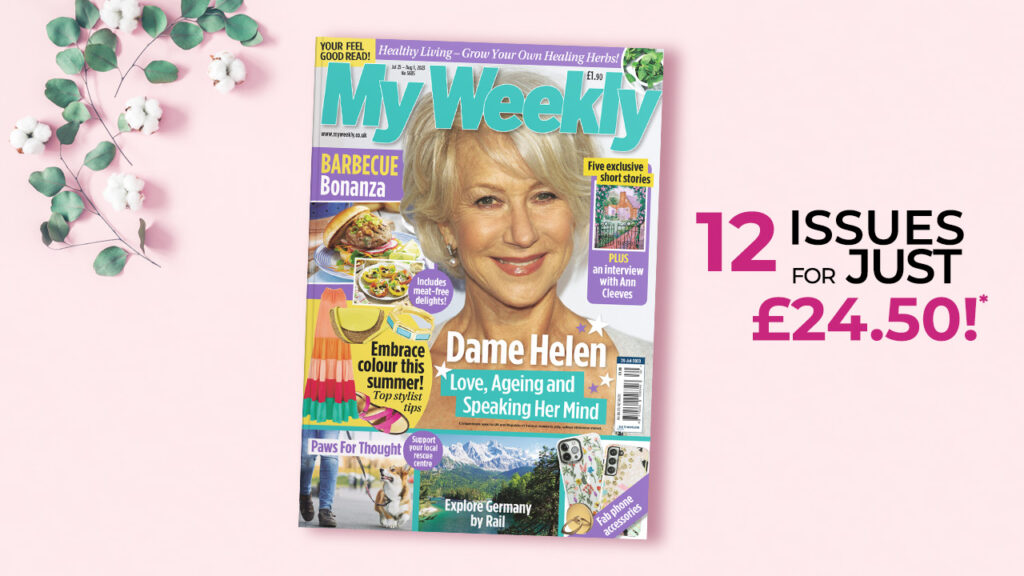Rose Cottage

Tina’s musical career had started with piano lessons here, but she wasn’t the one to be commemorated…
Tina, I can’t believe you bought Rose Cottage!” Carol said when we’d finished hugging as if we hadn’t seen each other for decades.
It had been a while. But now I was back. Finally putting down roots in retirement – at Rose Cottage.
“I can’t quite believe it’s mine either.”
We both moved away from the doorstep and surveyed the whitewashed stone façade of the tiny, terraced cottage with its blush pink front door framed by deeper pink climbing roses.
Enclosed by an old flint wall, the postage-stamp-sized cottage garden was fragrant with lavender bushes that needed pruning
and a myriad of other summer blooms, I’d yet to identify.
“Back where it all started,” Carol said, as we stepped inside.
I guess she’s right. In a way, my career did start here.
If I’d never had those weekly piano lessons with Mrs Rose, in this very cottage, who knows how my life would have turned out?
“Gosh! It certainly looks a bit different to the last time I saw this place,” Carol said. “Not surprising though, as that would have been sometime in the early 1970s!” She laughed.
Since then, the cottage had been thoroughly modernised, and its newly configured open plan was different to the dark two-up two-down we both remembered.
Taking in the changes, Carol’s eyes fell on the piano tucked into an alcove under the stairs.
“I love that you’ve found space for a piano … but you’d have to, wouldn’t you?” she said.
“Might have been a deal breaker if I couldn’t fit one in,” I agreed.
It wasn’t the baby grand I was used to – a classic upright was all I needed now.
Carol stepped towards the piano and lifted the lid.
“I haven’t played in years. May I?” Her fingers hovered over the keys.
“Help yourself!”
Pulling out the upholstered stool, Carol sat and gingerly played the opening notes to Chopsticks.
I couldn’t resist perching next to her and joining in before we smoothly segued into Dance of the Sugar Plum Fairy, a duet we’d played at a piano recital when we were twelve.
“Feels right, doesn’t it? Playing the piano in this cottage,” Carol said.
She’d taken lessons here too.
“Do you remember her… Mrs Rose, I mean?” I asked.
“Vividly. She always wore a plaid skirt and a knitted twinset – usually in a shade of pink, I seem to recall.”
I smiled, remembering our elderly teacher.
“Yes, she was rather fond of pink twinsets.”
MW Special subscription “Are you going to follow in her footsteps and offer piano lessons now that you’re retired?” Carol asked. “You’d be inundated with parents wanting their little darlings to be taught by you!” she added.
“Goodness no! I don’t have her patience.”
The idea of sitting for hours listening to children practising scales did not appeal, and I was grateful I wouldn’t need to resort to teaching to make ends meet.
“Although, I suppose I could give lessons if the royalties start to dry up,” I said, thinking aloud. “I doubt I’d be as good a teacher as she was though.”
“She was a lovely lady.”
“I owe her a lot. I hadn’t been taking lessons long when my dad lost his job.
“Money was tight, and I had to tell Mrs Rose I couldn’t come for lessons any more, but she wouldn’t hear of it.”
“Well, she obviously recognised your talent,” Carol said.
“Not everyone would have given free lessons though. And she never made me feel like I was a charity case.
“Mum would occasionally send me along with a dish of raspberries from our garden, or a jar of homemade jam as a thank you, and Mrs Rose always made me feel like I was giving her a special gift instead of the other way around.”
“She was naturally generous. Do you remember how she’d have a jug of lemon barley water ready for her pupils on hot summer days?”
“Yes! And sometimes she’d give out homemade ice lollies as an after-lesson treat. She was quite motherly, even though she didn’t have any children.”
“You weren’t here for her funeral, but the church was packed. No family, but she touched so many lives with her music over the years. She used to play for the choir, and the musical theatre group…”
I smiled. “She encouraged me to join the musical theatre. In fact, that’s where I met Martin…”
“And the rest is history, so they say,” Carol grinned.
A surprisingly well-documented history. I don’t make a habit of Googling myself, but a quick internet search will throw up a Wikipedia biography and the odd article or two about The Martinas – dreadful name, I know.
Not very original: a combination of Martin and Tina.
We met at rehearsals for The Sound of Music when we were teenagers.
We fell in love, and began writing songs together.
A demo tape we recorded fell into the right hands, and we signed with one of the biggest agents in the music business. A number one hit and appearances on Top of the Pops followed, and The Martinas were heralded as Britain’s answer to The Carpenters!
We only had one chart-topping hit, but Martin and I managed to hang around in the lower end of the hit parade for well over a decade.
Unfortunately, in the late eighties, on a tour of small-town arenas in America, Martin fell for a young backing singer.
That was the end of us, and The Martinas… but the beginning of a successful solo career for me as a singer-songwriter.
Ironically, other artists recorded my most successful songs, but nonetheless, I spent the whole of my working life singing and playing the piano for audiences all over the world.
During the last decade, I played a lot of 70s and 80s themed weekends at holiday camps across the UK.
I was also a staple on the cruise circuit.
Although towards the end, even the cruises were smaller – river jaunts in Europe rather than the ritzy razzle dazzle of international ocean liners.
Do you think you’ll miss the buzz of showbiz?” Carol asked later as we drank tea, sitting outside in my small back garden.
I shook my head. “I doubt it.”
Truth be told, I’d have happily settled down in a seaside cottage ages ago, but I’d needed to top up my savings. I was also beginning to develop arthritis in my fingers, so I couldn’t have kept playing forever.
“It’s time for me to put Tina of The Martinas behind me.”
“Oh, I almost forgot! My neighbour’s daughter works on The Gazette, and she’d love to write a little piece about you – Pop Star Returns Home kind of thing.”
“If I was promoting a new song, I might consider it, but my return is hardly newsworthy, and I’m looking forward to retiring into obscurity,” I chuckled.
“You won’t be getting a blue plaque for your cottage then?”
“A blue plaque?” I frowned, unsure what Carol meant.
“You know, one of those national heritage signs displayed on buildings where famous people lived or did something memorable,” Carol explained. “I noticed one on your neighbour’s house a few doors down. Apparently, a famous author was a frequent visitor and used the family who lived there as inspiration for one of his novels.”
“Oh right, yes, I read it the other day when I walked past on my way to the beach.”
“Well, surely Rose Cottage will qualify for a heritage plaque now that you’re living in it!” Carol insisted.
I couldn’t stop myself from laughing aloud.
“I think they’re reserved for the great and the good, Carol – people of historical significance – not one-hit-wonders from years ago.”
“I read somewhere that Freddie Mercury’s old house has a blue plaque, and apparently David Bowie has three of them in various locations.”
“Oh Carol, I was never in the same league as them. Besides, I don’t think I want people to know where I live.”
Ignoring my last remark, Carol pulled out her phone.
“Let’s see… who qualifies for a blue plaque…?” she mused and began tapping her screen.
“It’s immaterial, because I don’t want one,” I repeated firmly, and then I deftly changed the subject by getting up and asking her what she thought I should do about the garden.
Later that evening though, I found myself thinking again about the blue plaque. I did a Google search of my own.
It was interesting to learn that while a lot of the people awarded a sign were well-known in the worlds of entertainment and politics, many of them were just ordinary individuals who had impacted the lives of others in meaningful ways.
Maybe I’d qualify after all, I thought with a wry smile.
My smile was replaced by a mouth-open, jaw-dropping look of shock when I saw the cost of an official blue sign.
To be fair, when I read about the painstaking process involved in crafting a commemorative plaque, I could see the producers deserved the fee, but it was more than my tight budget would stretch to, so I did a little more searching.
The next day, I took a drive to a village in the Downs and visited a local artisan. Half an hour later, I left the studio with a set of four coffee mugs, feeling pleased with my purchases.
The following week, I invited Carol over for coffee. I was keen to show her the progress I’d made on the back garden and to use my new mugs, but I had another surprise I was more excited to share with her.
Waiting by the front window for Carol to arrive, I flung open the front door as soon as I saw her at the garden gate.
“I took your advice! What d’you think?”
I pointed to the brand-new plaque that I’d secured to the front wall of the cottage earlier that day.
“Oh, Tina! It’s perfect!”
“It’s the same size as the ones issued by English Heritage, but obviously it’s not official – there’s a whole process to go through to get one of those.” I rolled my eyes. “And besides, this one is much prettier,” I said.
We admired the glazed ceramic disc which, instead of being the traditional blue, was a soft, dusky pink.
“That shade of pink reminds me of the knitted twinsets Mrs Rose used to wear,” Carol observed.
“Ha! You’re right, although that wasn’t my intention,” I admitted.
When I’d chosen the colour, I’d been more interested in complementing the paint on my front door, and it was pure serendipity that my colour choice was so appropriate.
“That rose is a nice touch too.”
Carol dabbed at her eyes before reaching up and touching the deep pink rose painted underneath the inscription, which read, Mrs Rose, a much-loved piano teacher, lived in this cottage between 1946 and 1998. She brought music and joy into the lives of everyone who knew her.
“I think Mrs Rose would approve.” Carol gave me a hug.
“It’s so pretty. Are you sure you’re not tempted to get one for yourself?”
“Definitely not! Besides, according to the rules of the official plaques, the person being commemorated must have been dead for twenty years.”
“Oh! OK, well then, I’ll say no more about it in that case,” Carol laughed. “But I’m glad you got this one, because if anyone deserves to be remembered, it’s Mrs Rose of Rose Cottage.”
More lovely fiction – from heartwarmers to cosy crime and big name author exclusives – in every issue of My Weekly. Click here to subscribe and have your copy delivered.





